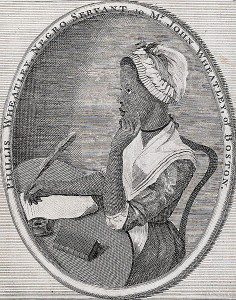Others at the Anxious Bench know far more about the subject than I do, but I enjoyed reading Jonathan Yeager’s Books & Culture review of Vincent Caretta’s new biography of Phillis Wheatley (A Genius in Bondage reads the subtitle).
I’ve always wanted to know more about Wheatley, especially after becoming somewhat familiar with Atlantic World evangelicals of African descent such as Olaudah Equiano and Rebecca Protten.
I found this passage in Yeager’s review worthy of thought:
The wealthy evangelical merchant John Wheatley and his wife, Susanna, bought the young girl, naming her Phillis after the slave ship that carried her across the Atlantic … While recognizing that the Wheatleys’ kindness toward Phillis was rare at that time, Carretta bypasses any thorough analysis of the role that faith played within the family. Instead, benevolence toward Phillis was meant “to publicize their status, piety, and charity.” … It is certainly possible that the Wheatleys paraded Phillis about as a way of highlighting their wealth and status, but another scenario, and one that is not seriously considered by Carretta, is that John and Susanna Wheatley genuinely cared for Phillis and made sure that she was given ample free time to develop her talent as a writer.
Caretta questions the common reading of “On being brought from Africa to America”:
…critics confuse accommodation with appropriation. Like many authors of African descent who follow her, Wheatley repeatedly appropriates the values of Christianity to judge and find wanting hypocritical self-styled Christians of European descent. Theologically, Wheatley perceives her capture in Africa as leading to a fortunate fall that allows her formerly “benighted soul” to rise to embrace Christianity.
Here are the concluding lines of that poem: “Some view our sable race with scornful eye, “Their colour is a diabolic dye” / Remember, Christians, Negroes, black as Cain, May be refin’d, and join th’ angelic train.” Those lines seem to reference the alleged curse of Cain. While “black as Cain” hints at that view, Wheatley very much rejects any notion of a curse. Blackness is not a “diabolic dye.”
While the success of Wheatley’s first (and only) published book enabled a trip to London and contributed to her manumission, Wheatley never convinced publishers to issue a second book of her poetry.












